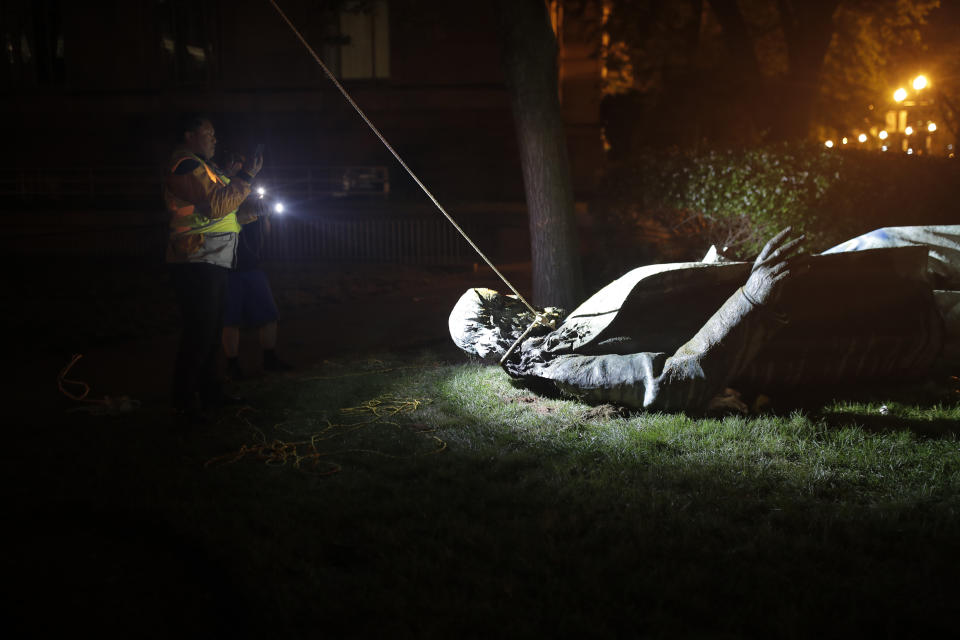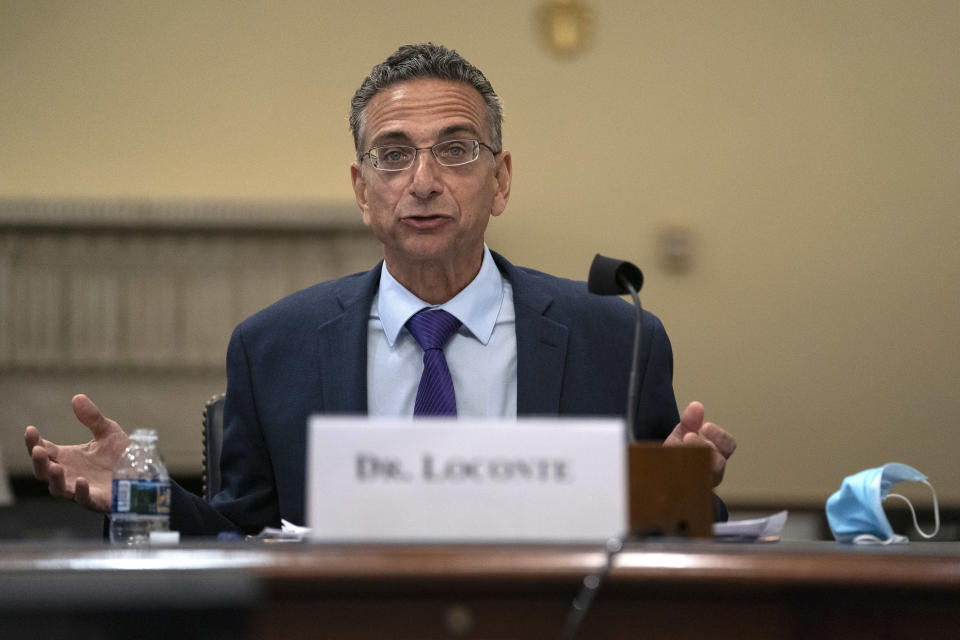'Black lives matter,' descendant of Confederate Gen. Robert E. Lee tells Congress, urging removal of racist symbols
WASHINGTON — The three words have become a common refrain throughout the summer, chanted by protesters filling city streets, uttered by politicians of both major parties, written on placards foisted by children marching against racism. And yet those words were especially remarkable when uttered, in congressional testimony on Tuesday, by a descendant of Robert E. Lee, the Confederate general.
“Black lives matter,” said the Rev. Robert Wright Lee IV at a House Natural Resources Committee hearing to consider Confederate statues on public lands. As Lee pointed out, many of those symbols feature his great-great-great-great uncle, whose surrender in 1865 at Appomattox Court House, Va., ended the Civil War.
Many of the Confederate statues that now face removal were actually erected several decades later, as part of a “Lost Cause” mythology that skewed history in a way that was highly favorable to the Confederacy. The statues also served to remind African-Americans across the South of their second-class status.
The hearing was chaired by Rep. Deb Haaland, D-N.M., who last year became one of the first two Native American women to hold a seat in Congress.
In contrast to his pro-slavery ancestor, the Rev. Lee is a vociferous advocate of racial justice. "If we are honest, the answer is clear,” he told legislators. “We cannot remain complicit with these monuments. We cannot remain silent any more. If we do, our silence becomes agreement and endorsement to complicity.”

His impassioned call to remove Confederate statuary comes at a time of intense national debate over how to commemorate the brutal legacy of slavery, as well as the bloody war the South waged to preserve its “peculiar institution.” President Trump has eagerly engaged in that debate, apparently believing it will mobilize Republicans to vote for him in November’s presidential election.
“I know people that like the Confederate flag and they’re not thinking about slavery,” Trump recently told an interviewer. He has said he will still block any attempts to change the names of military bases named for Confederate figures, and he has ominously warned that if Confederate statues are allowed to be removed, Founding Fathers like George Washington and Thomas Jefferson could be next.
He recently signed an executive order holding that “no individual or group has the right to damage, deface, or remove any monument by use of force.”
Congress has limited ability to remove statues or symbols, no matter how racist or offensive, unless the objects in question are on federal land. Still, the hearing represented a public rebuke of Confederate symbols at a time when attention to the issue was already high.
Among the witnesses was a member of Congress, Washington, D.C., delegate Eleanor Holmes Norton. Late last month, protesters in the district toppled a statue of Albert Pike, a Confederate general whose troops were accused of atrocities. A contemporaneous account in the New-York Tribune said that Pike “deserves and will doubtless receive eternal infamy.”
He was instead memorialized with a statue erected in 1901.

Holmes Norton had been pushing the Department of Interior to remove the statue before it was toppled. “I believe that relocating this statue to a museum and adding historical context would be the most appropriate option,” she said, noting that even the Freemasons, the organization that had erected the monument, agreed with her that it no longer belonged in the nation’s capital.
Another of the witnesses at Tuesday’s hearing was Rep. Anthony Brown, D-Md., who in 2017 introduced legislation to remove a statue of Gen. Lee from the battlefield of Antietam, where 12,000 Union and 10,000 Confederate troops were killed in one of the most consequential battles of the Civil War. That battlefield is also under the purview of the Interior Department.
Implicitly addressing Trump’s charges of historical erasure, Brown said that “Confederate soldiers and the Confederacy itself will continue to be written about and studied as a part of the dark history of our nation.” Much like Holmes Norton, he thought that museums were an appropriate setting for Confederate statuary.
Interior Secretary David Bernhardt is a Trump loyalist and longtime Republican operative who is unlikely to comply with Brown and other legislators pushing for Confederate statues to be removed from federal lands. Speaking earlier this week with American Conservative Union’s Matt Schlapp, another staunch supporter of the president, Bernhardt endorsed harsh measures against protesters attempting to tear down monuments like that of Pike.

“We’re arresting them and we’re going to prosecute them and they’re going to find out that it’s not jaywalking to go trying to tear down a monument,” Bernhardt told Schlapp. “This is a big-time crime and we’re coming down hard,” the secretary said moments later. “And we’ve scared these people. I mean the reality is now we’re rounding them up.”
Conservationists who have battled Bernhardt over land use issues condemned the remarks, contrasting his stance on Confederate monuments with that on open lands across the West. “The Trump administration's hypocritical defense of Confederate monuments after illegal and unilaterally revoking protections for the historically and culturally significant Bears Ears National Monument area in Utah should tell you everything you need to know about their values," said Jayson O'Neill, director of the Western Values Project, a not-for-profit group that frequently battles the Trump administration.
In 2018, the Trump administration announced that it would remove federal protections from hundreds of thousands of acres within Bears Ears and Grand Staircase-Escalante National Monument, both of which are in Utah. That will soon open those lands to oil drilling and other extractive industries.
The sole Republican witness at Tuesday’s hearing was Joseph Loconte, a conservative historian affiliated with the Heritage Foundation, which has frequently advised the Trump administration. Loconte said there was “nothing noble about the unlawful assaults on our historic monuments. There is nothing admirable about violent mobs taking over city streets, destroying businesses and terrorizing civilian populations,” referring to instances of looting and confrontations with police that took place amid antiracism protests that started in May.

He described monuments like those to Lee and Pike as “our cultural inheritance” and urged that those monuments be amended with contextual materials, not removed.
Rep. Haaland took issue with Loconte’s defense of historic statuary, in particular singling out his reference to Christopher Columbus. Several statues of the European explorer have been torn down in American cities. “I’m a 35th generation New Mexican,” she said. “Christopher Columbus murdered thousands of indigenous people when he came over to this part of the world,” describing him and the Europeans who followed as destructive colonists.
“This country is founded on genocide,” Haaland told Loconte. She said that the cruelty of colonization persisted in the practice of slavery. “I couldn’t let this hearing go by without mentioning that,” she said.
_____
Read more from Yahoo News:



